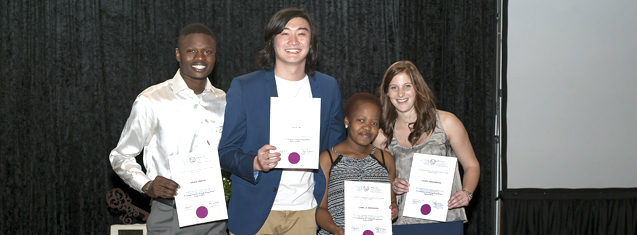Latest News Archive
Please select Category, Year, and then Month to display items
02 January 2025
|
Story Gerda-Marie van Rooyen
|
Photo Supplied
 Leading the research in South Africa is Prof Linus Franke from the Department of Soil, Crop and Climate Sciences.
Leading the research in South Africa is Prof Linus Franke from the Department of Soil, Crop and Climate Sciences.
Scientists are actively pursuing the successful breeding of diploid hybrid potatoes from inbred lines. This is expected to revolutionise potato breeding as it holds the key to rapid genetic progress. It will introduce new varieties for commercialisation through seed. Currently, existing potato variants have a gene that renders self-pollinated seeds infertile.
Prof Linus Franke, an academic in the Department of Soil, Crop and Climate Sciences at the UFS, is leading the research in South Africa. “This technology allows the production of genetically uniform potato seed that is easy to transport and largely disease-free.” He says this differs from conventional breeding whereby only vegetative propagation is possible due to tetraploid varieties in potatoes. It also risks carrying pests and diseases from one generation to the next – leading to the accumulation of pests and diseases with each round of multiplication.
Seed innovation
Prof Franke explains that Solynta BV, a seed company based in the Netherlands that produces potato varieties that can be grown from seed, has included South Africa in their research efforts because it is one of Africa’s largest producers and exporters. Through his academic relationship with Wageningen University and Research, a Dutch institution renowned for its agricultural endeavours and food production, the UFS became involved in researching hybrid potatoes grown from seed.
Diploid seeds containing two sets of chromosomes allow easier gene manipulation to increase predictability and speedier genetic progress. The breeding approach enables the incorporation of tolerance to pests, diseases, abiotic stresses (cold, heat, drought) and other desired genetic traits.
Although Prof Franke is optimistic about this research, he is not blind to disadvantages. “Potato seeds are tiny and have little energy reserves, making it harder to grow potatoes from seed than from tubers.” He says potatoes from seed will take longer to cultivate than tubers, as farmers need to grow plantlets from seeds first, adding six weeks to the growing period. “It is possible that commercial farmers can grow potatoes directly from seed. Alternatively, perhaps more likely, specialised growers will produce tubers of potatoes from seed; these tubers are then sold as seed tubers to other potato farmers, who then continue their normal practices of producing potatoes for the market from tubers.”
Financial benefits
Prof Franke says farmers have reason to get excited. “Seed potatoes will reduce input costs, as varieties with enhanced tolerance to pests and diseases require less pesticides. Planting one hectare of potatoes requires three to four tonnes of potato tubers, but only one 25 g packet of potato seeds.” Since potatoes are a more valuable commodity than maize, this technology might also increase farmers’ income potential.
Leadership for Change celebrates graduation ceremony
2014-10-15

The Leadership for Change Programme hosted its third annual graduation ceremony on 9 October 2014 at the Centenary Complex on the Bloemfontein Campus.
The event consisted of two segments. The first was aimed at the group who has travelled abroad during the past year. They were presented with special certificates acknowledging the work they have done during their participation in the programme.
The second element of the evening was to wish the 2014/2015 group all of the best for their upcoming travels. This group will be travelling abroad during next year. Of the 250 applicants, the top 32 students were chosen to be part of the Leadership for Change Programme.
Prof Jonathan Jansen, Vice-Chancellor and Rector, said, “I hope you came back with the capacity to distinguish right from wrong – not only through law, but morally as a leader.”
Waldo Staude, Vice-president of the Student Representative Council (SRC), acted as Chair to the evening’s proceedings. He is also an alumnus of this programme.
“This programme has made its mark as we observe the number of leadership positions our students from the programme hold on this campus,” Staude said. “We have eight Leadership for Change students in the SRC for the 2014/15 term.”
The Leadership for Change Programme each year gives first-year students exposure to top universities throughout the world. Its focus is to establish a new campus culture of student relations across boundaries.
Six cohort groups – of between five to six students each – will visit universities on three different continents in January 2015. Each group will be accompanied by a UFS staff member serving the role of mentor.
The universities they will be visiting (according to continent), are:
USA
Cleveland State University
University of Minnesota
University of Vermont
Europe
The Netherlands: Vrije University in Amsterdam
Belgium: University of Antwerp and Ghent University
Asia
Japan: International Christian University